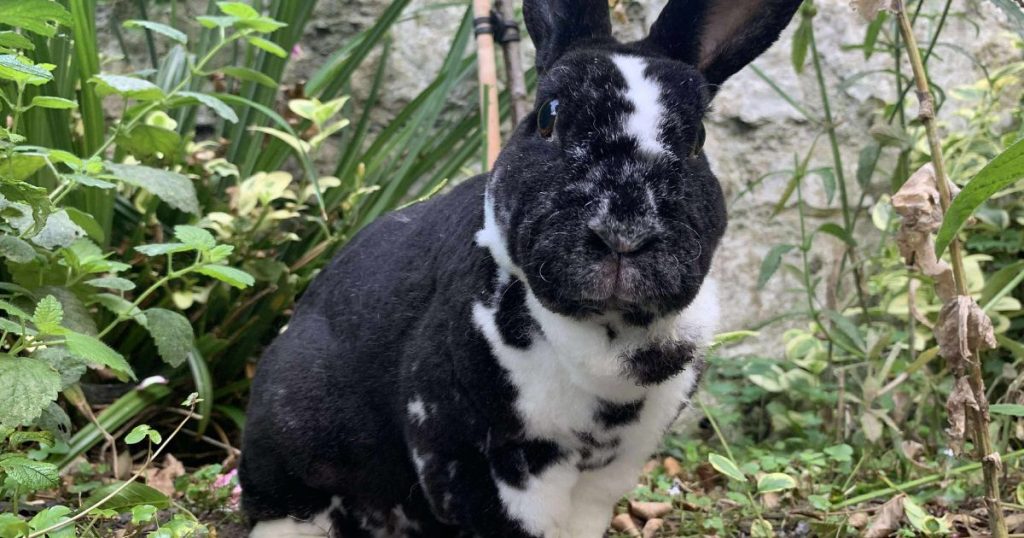Whether your rabbits live indoors or out, time in the garden is a great way to encourage natural behaviours – but it must be done in the right way to ensure their safety.
As well as being an ultimate bunny playground, a garden can be a gauntlet of hidden risks. From foxes to foxgloves, these risks are real – so what can we, as rabbit guardians, do to mitigate them?
How to secure your garden for rabbits
Securing your garden is vital. In an ideal world, there would be a full wire cover of the garden, both to keep predators out and to keep bunnies in. We recognise that this isn’t exactly the most possible or attractive of solutions, so we’ve compiled a few things for you to consider before granting your rabbits outdoor time.
The minimum space requirements for a pair rabbits is 60 sq ft, accessed 24/7. If this is in a run, it should be a minimum of 3 ft high to allow bunnies to exhibit natural behaviours including running, periscoping and of course binkying! Ensure that runs are made with 16g wire with the gaps no bigger than half inch square in size. The base should also be secure to prevent rabbits digging out and predators digging in. Options to secure a run base include having a fixed base (slabs for example) or laying mesh under the lawn itself. If this method is chosen, it should be extended beyond the perimeter of the enclosure to extend protection. Locks should also be secure and not able to be opened accidentally.
If you have the room, a tunnel system can make a fantastic environment to entertain bunnies, allowing them to navigate the garden without the risks from free roaming. Customise the design to your garden to allow you to get the most from the system – it is possible to raise these tunnels or even bury them, both of which are great enrichment for your bunnies.
Free roaming bunnies in the garden is not without its risks. If you choose to do this, you should never leave your bunnies alone, not even to nip inside or to watch from the kitchen window. In the blink of an eye, large birds of prey, foxes or even the friendly neighbourhood cat can swoop in and cause tragedy. Whilst there are deterrent measures that can be implemented (high fences, for example) these do not remove the risk of attack and so free roaming should always be exercised with extreme caution.
The risks do not stop with predators; many common garden plants are highly poisonous to rabbits and can be fatal. Creating a bunny-friendly garden is an excellent idea and not at all difficult to do. Not only is it safe, but it also provides some wonderful plants to use as forage for your bunnies throughout the year. Herb gardens, roses, marigolds, lavender and fruit bushes can all be great options. Save yourself some money and avoid the chemical fertiliser – use rabbit poop instead! Leave the daffodils (and most other bulb plants), foxgloves and ivy for the front garden where possible – all these common plants are toxic to rabbits. Any plants that are unsafe, take measures to block them off from little paws and mouths.
If painting in the garden, always be sure to use animal-safe paints to prevent issue if bunnies have a nibble. We recommend Cuprinol Garden Shades.
Plug all gaps! Fences with secure gravel boards or walled gardens are probably the easiest to secure as gaps stand out but it is possible to secure a garden that is lined with hedging too. Regardless of how small the gap seems to be, a determined rabbit will find it, and so fill or block off all gaps – you can use puppy pens, slabs of concrete or slate or wiring.
When bunnies are outside, ensure that good quality hay, water and shelter are always available. Cardboard boxes can make great hides but are not particularly waterproof and so having an area with a waterproof cover is ideal. You will also need a shaded area, this is especially true if you have artificial lawn which can become extremely hot to the touch. Bunnies are hardy in the cold but struggle to keep cool in the sun so we do need to take as many precautions as necessary to keep them comfortable. We also recommend providing cooling pods or frozen bottles on hot days to assist bunnies in regulating their temperature.
Rabbits do not need time outside, but if you would like to let your rabbits have some fun in the garden, please always exercise precaution and use common sense to make sure they can enjoy themselves safely.





